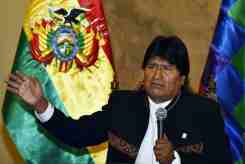
La Paz, Bolivia (AFP)—Bolivia’s President Evo Morales has lost his bid to seek a fourth term, his first direct election defeat since taking office in 2006, according to official results released Tuesday.
Morales, 56, has been in power for a decade, thanks largely to support from indigenous groups and grassroots organizations in one of the Americas’ poorest countries.
While refusing to concede until the very end, Morales has promised to respect the official results of Sunday’s vote on a constitutional reform that would let him run for re-election to extend his time in office to 19 years.
His current term ends in 2020.
With 99.49 percent of votes counted, electoral board president Katia Uriona said that 51.31 percent of voters cast “no” ballots in the referendum, against 48.69 percent voting “yes.”
Morales had insisted on waiting for full results to come in from rural areas where he has strong support, and from abroad.
Opposition claim victory
The official results were in line with exit polls published by private media, which indicated Morales lost the vote.
Political scientist Jorge Lazarte said the results showed that “part of the country… has said enough is enough,” which will force Morales to now seek consensus with the opposition.
Opposition groups feared the government was preparing to manipulate the result.
Groups chanting “Fraud! Fraud! Fraud!” staged a sit-in outside the office in La Paz where votes were being counted late Monday.
However, the general mood across the country of 10 million was calm.
Observers from the Organization of American States urged all sides to accept the results when the electoral board publishes them.
Earlier, opposition figures celebrated their projected victory.
“We have recovered democracy and the right to choose,” said Samuel Doria Medina, whom Morales twice defeated in presidential elections.
Morales had said he was prepared to give up on a fourth term if voters rejected the bid.
“With my record, I can leave happily and go home content. I would love to be a sports trainer,” the Spanish newspaper El País quoted him as saying.
Economic growth, corruption
In January, Morales became the longest-serving president since Bolivia’s independence from Spain in 1825 — rare in a country that has seen numerous military coups.
He is one of a generation of Latin American leftist leaders who champion “21st-century socialism.”
Since first taking office, he has been strongly re-elected twice and has overseen robust economic growth.
Bolivia’s mineral and gas-rich economy more than tripled in size during his decade in office.
But opponents accuse him of presiding over corruption and wasteful spending.
His popularity has suffered from allegations that he used his influence in favor of contracts for CAMC, a Chinese engineering company that employs his ex-girlfriend.
Morales’s defeat could disrupt the remainder of his term and his Movement to Socialism (MAS) party, a grouping of unions and social movements, analysts say.
“These results will probably cause an internal struggle to replace him,” analyst Andres Torres said.
“It could weaken the party and cause an implosion with serious problems for the MAS in the four years it has left in government,” he said.
But analysts at the Eurasia Group consultancy said Bolivia’s relatively strong economy made it “unlikely” that the country would suffer instability in the short term.
© 1994-2016 Agence France-Presse







